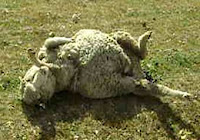Keep Your Child on the Path of Maturity
I read an interesting fact about sheep recently. (You might wonder why I read anything about sheep…I really don’t know, it just happened.) At first, I did not believe what I read. Then, I heard the same fact again, this time on TV (Dirty Jobs). Intrigued, I began to investigate and discovered the fact was tru e. What was the fact? When a sheep gets turned onto its back, it may have difficulty turning upright and standing. Shepherds call this sheep “cast.” The “cast down” sheep will lie on its back, struggling to turn over. If the shepherd does not help the sheep turn over and stand upright, internal gases build up and the sheep can die.
e. What was the fact? When a sheep gets turned onto its back, it may have difficulty turning upright and standing. Shepherds call this sheep “cast.” The “cast down” sheep will lie on its back, struggling to turn over. If the shepherd does not help the sheep turn over and stand upright, internal gases build up and the sheep can die.
 e. What was the fact? When a sheep gets turned onto its back, it may have difficulty turning upright and standing. Shepherds call this sheep “cast.” The “cast down” sheep will lie on its back, struggling to turn over. If the shepherd does not help the sheep turn over and stand upright, internal gases build up and the sheep can die.
e. What was the fact? When a sheep gets turned onto its back, it may have difficulty turning upright and standing. Shepherds call this sheep “cast.” The “cast down” sheep will lie on its back, struggling to turn over. If the shepherd does not help the sheep turn over and stand upright, internal gases build up and the sheep can die. That got me thinking…our children can “get knocked down” or “knocked off their feet,” discouraged and “cast down” for several reasons. Failure can lead to a “cast down” child who is discouraged and afraid of trying again, of “standing on my own two feet.” Self-indulgent behavior can lead to selfish, lopsided living that will eventually “knock their feet out from under them” and “cast them down.” Disobedience brings consequences that can leave a person “flat on their back,” fearful of losing support and love. Ridicule and teasing can knock a child down, leaving them discouraged and doubtful about themselves. Even just feeling misunderstood can bring us down and result in our feeling “cast down,” hopeless and helpless. A child who feels discouraged and “cast down” becomes vulnerable to the world. Other children prey on the discouraged and “cast down” child. Drugs and sexual intimacy become more alluring to the discouraged, “cast down” child. In fact, if not rescued quickly, the “cast down” child becomes at risk for all sorts of dangerous behaviors. What is a parent to do? What lesson can a parent learn from the “cast down” sheep? How can a parent successfully shepherd a “cast down” child? Here are 5 lessons of a “cast down” sheep.
Drugs and sexual intimacy become more alluring to the discouraged, “cast down” child. In fact, if not rescued quickly, the “cast down” child becomes at risk for all sorts of dangerous behaviors. What is a parent to do? What lesson can a parent learn from the “cast down” sheep? How can a parent successfully shepherd a “cast down” child? Here are 5 lessons of a “cast down” sheep.
 Drugs and sexual intimacy become more alluring to the discouraged, “cast down” child. In fact, if not rescued quickly, the “cast down” child becomes at risk for all sorts of dangerous behaviors. What is a parent to do? What lesson can a parent learn from the “cast down” sheep? How can a parent successfully shepherd a “cast down” child? Here are 5 lessons of a “cast down” sheep.
Drugs and sexual intimacy become more alluring to the discouraged, “cast down” child. In fact, if not rescued quickly, the “cast down” child becomes at risk for all sorts of dangerous behaviors. What is a parent to do? What lesson can a parent learn from the “cast down” sheep? How can a parent successfully shepherd a “cast down” child? Here are 5 lessons of a “cast down” sheep. 1. Be vigilant. Remain attentive of your children, “keep an eye” on them. Vigilant parents remain aware of their children’s friends, interests, and even moods. They are observant of any changes, especially abrupt changes, in friendships, interests, and moods. As parents remain attentive and aware of their children and their children’s lives, they can recognize when their children become “cast down.” They can then respond quickly and appropriately to help their children get “back on their feet” as soon as possible.
2. Provide gentle, loving correction. Parents help their children “stay on their feet” by replacing harsh, crushing punishment with loving discipline and correction. Remember, the purpose of discipline is to teach appropriate behavior, not crush inappropriate behavior. Make sure the discipline teaches your children and strengthens their moral muscles, enabling them to “stand on their own two legs” amidst any pressures that arise. Rather than coercing them to behave a certain way, assure that the consequences of misbehavior are more uncomfortable than the consequences of positive behavior. Teach them the benefit of rules.
3. Become an encourager not a faultfinder, an advocate not a critic. Look for opportunities to praise your children for their effort and their progress. Encourage their appropriate behavior. Even when you have to offer criticisms, preface the criticism with some acknowledgement of positive behaviors. Keep criticism constructive, not destructive. Lift your children up with your encouragement rather than “casting them down” with your discouragement.

4. Provide opportunities for your children to serve in the home and outside the home. Your children are a member of your family’s household and, as such, they have the responsibility to help maintain your family’s household. Do not rob them of that responsibility and allow them to become self-indulgent. Instead, maintain an expectation that everyone contributes to the household and then provide opportunities to do so. Give your child responsibility to complete meaningful chores in the home. Create opportunities for you and your child to work together on projects around the house or in the community. Encourage their participation in these service projects. Celebrate their involvement and the completion of each project.
5. Be your child’s ally. Support them in pursuing interests. Defend them in difficult circumstances. When they experience failure, lift them up. When they disobey and suffer consequences, help them get back on their feet. Assist them in learning from those mistakes and in learning how to make better decisions in the future. Express faith in their ability to learn and grow. Brace them up when they face challenges and reinforce their positive efforts.
Our children, like sheep, can become “cast down” by a variety of circumstances. You, their parent, have the best opportunity to return them to the appropriate path of maturity. Be vigilant, provide loving discipline, encourage, create opportunities to serve others, and become your child’s ally. Happy Shepherding.